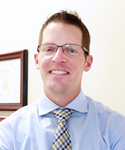 As the SARS-CoV-2 pandemic continues, taking the time to think about the lessons learned in 2020 is becoming increasingly important. Chris Phillips, MD, solo practitioner with Paducah Rheumatology, Kentucky, and member of the ACR’s COVID-19 Practice and Advocacy Task Force discussed with The Rheumatologist (TR) what it was like during the pandemic’s initial phase and what practices can be applied going forward.
As the SARS-CoV-2 pandemic continues, taking the time to think about the lessons learned in 2020 is becoming increasingly important. Chris Phillips, MD, solo practitioner with Paducah Rheumatology, Kentucky, and member of the ACR’s COVID-19 Practice and Advocacy Task Force discussed with The Rheumatologist (TR) what it was like during the pandemic’s initial phase and what practices can be applied going forward.
TR: What have you learned during the COVID-19 pandemic?
Dr. Phillips: One of the bigger things is [the reminder] that life is fragile, as is the economic wellbeing of our practices. The wellbeing of the practice is closely entwined with that of the economy and the health of our patients. This experience may lead us to be more conservative in our assumptions about the health of our practices, continuing to take reasonable measures to safeguard our financial wellbeing.
TR: How has telemedicine changed your practice?
Dr. Phillips: COVID-19 forced telemedicine upon us. It was something I knew about, but didn’t I think I had the technical wherewithal to embark upon. By force of necessity, we know how to do telemedicine now.
Telemedicine will continue, but have a smaller role in our practice—especially in rheumatology, because we are fewer and our patients are often farther away. Some of our more distant patients, those who are older and those less able to travel may expect telemedicine to continue, and we should be prepared for that.
We don’t know how the relaxed regulations, which were allowed [during lockdowns], will fall out. For example, we don’t know about payment for audio-only visits. Will Medicare allow us to interview patients in their homes? The use of telemedicine post-COVID-19 will depend on the regulatory and reimbursement environment, which is still being defined.
TR: What changes have been made to in-office appointments?
Dr. Phillips: In western Kentucky, we have long been reopened. We were telemedicine heavy in March and April, when everyone was scared and didn’t know what was going to happen. In our area, the prevalence of COVID-19 has been very slow to rise, so we have been open full time for months.
In line with guidance from our state health department, we are calling patients, prescreening them for exposure, checking temperatures at the door, and we and our patients are wearing masks. We are just now seeing upticks [in the infection rate] to the highest levels we have seen [in the state]. If COVID-19 continues to be more prevalent, it could be a hard winter.
TR: What have been your patients’ concerns about the effects of immunosuppressant medications during this pandemic?
Dr. Phillips: My patients have been all over the spectrum. Early in the pandemic, we messaged patients they shouldn’t stop treatment, and we wanted to talk to them about their concerns. As COVID-19 has progressed, we’ve gotten data from the COVID-19 Global Rheumatology Alliance about rheumatic patients who have contracted COVID-19. The data have been reassuring suggesting prednisone above 10 mg is a risk factor for complications, but the other drugs we use seem to not have increased complication risks. Speaking for myself, that data have given me a reasonable comfort level.
TR: What are you telling your patients about a possible COVID-19 vaccine, and are you using the ACR vaccine guideline/COVID-19-related guidance?
Dr. Phillips: We are in the process of rolling out that literature in our office. My messaging is following closely what is in the document. I’m focusing on vaccines being generally safe.
The conversation I have been having with my patients is that they—and myself—should be prepared to get the vaccine at some point. For the vast majority of people, the risk to benefit [profile] is going to [favor] taking the vaccine. It’s hard to give firm guidance when we don’t know which vaccine(s) will be available.
TR: What is next for your practice?
Dr. Phillips: The biggest point for me is I don’t think we can begin talking about recovery from COVID-19 right now. The first battle is over, but the next one is yet to come. I’m anxious about how winter is going to go. I am hopeful that those of us who got through the initial storm—physically and financially—are equally successful in weathering the second storm.
We have learned to be much more flexible. Over the next few months, we can’t assume anything about what the environment will look like. We have to be super flexible. We can’t assume things are fine and will continue to go that way, so that our bank accounts will stay full, and we will stay healthy. We can no longer take any of these things for granted.
Kurt Ullman is a freelance writer based in Indiana.




